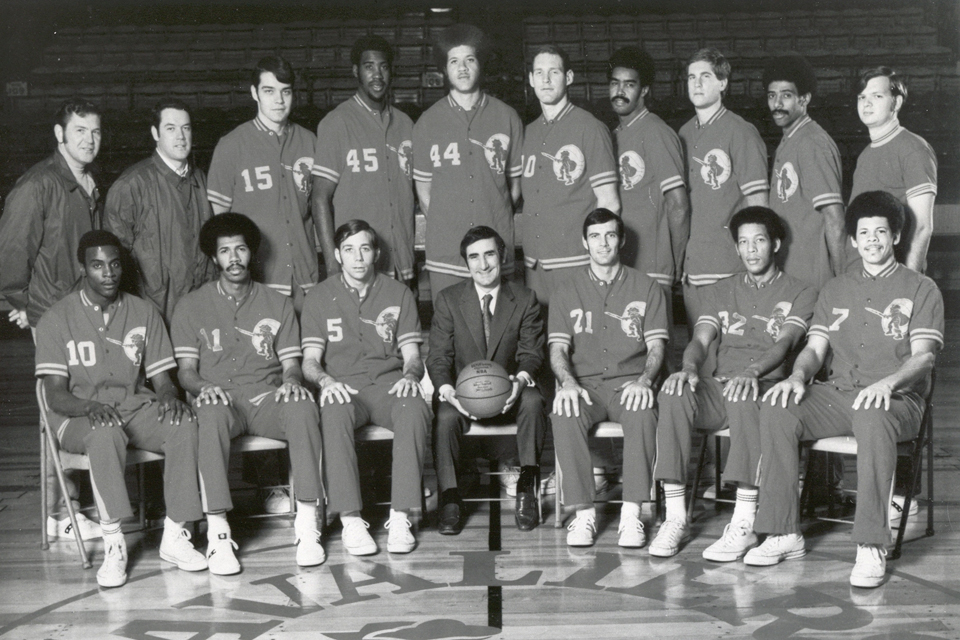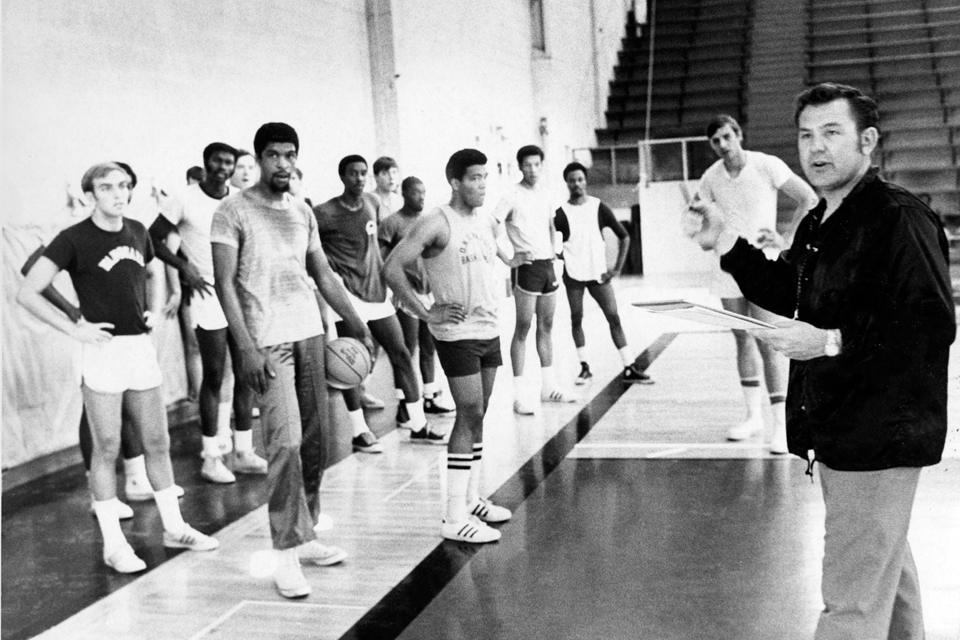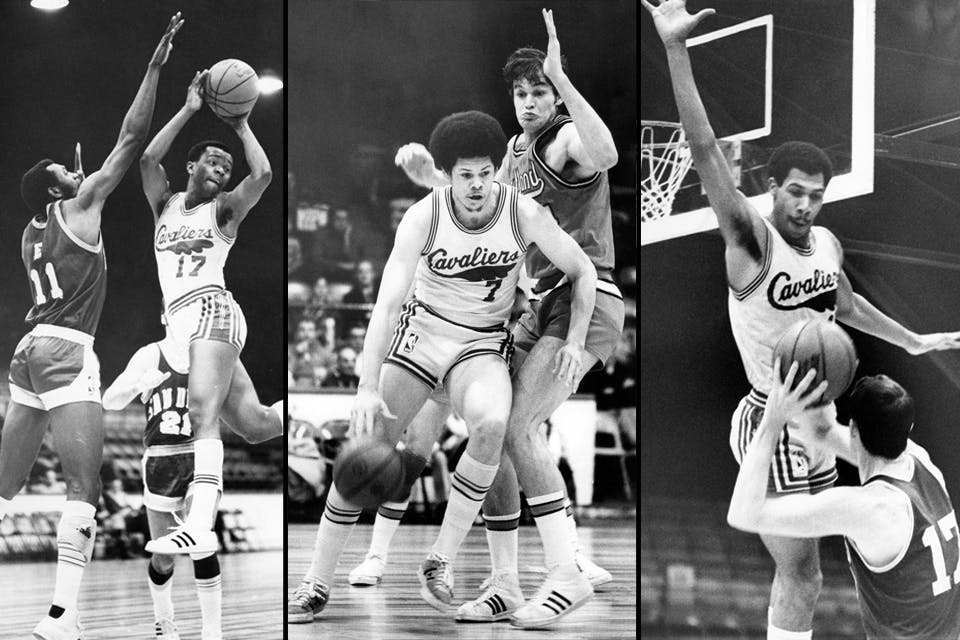The Wild Story of the Cleveland Cavaliers’ First Season
Here’s the behind-the-scenes story of the Cleveland Cavaliers’ inaugural season in the words of those who lived it.
October 2015 Issue
BY Vince Guerrieri | Photos courtesy of The Cleveland Press Collection
October 2015 Issue
BY Vince Guerrieri | Photos courtesy of The Cleveland Press Collection
LeBron James’ triumphant homecoming in 2014 put the Cleveland Cavaliers in the center of the basketball universe. The team marched through the Eastern Conference that
year on its way to the organization’s second NBA Finals appearance.
It was a new chapter for Cavs fans, who have experienced incredible highs (the “Miracle of Richfield” in 1976), soul-crushing lows (“The Shot”
that Michael Jordan took over Craig Ehlo in the 1989 playoffs) and a spectrum of team colors (wine and gold, then blue and orange, then black with a bizarre pastel-blue splash, then back to wine and gold).
Today, the Cavaliers play just
a mile and a half from where the team’s inaugural season tipped off on Oct. 14 1970. At the start of that 1970–1971 season, the Cavaliers were the newest in a string of professional basketball teams to call the city home.
--
Editor’s Note: This article was published in 2015, but was most recently updated in October 2024 to note at the bottom that several of the sources included in this story have passed away.
--
The Rosenblums, named for and sponsored by a local department store, joined the American Basketball League in 1925, but the league suspended operations six years later. In 1946, Cleveland Barons hockey team owner Al Sutphin formed the Cleveland Rebels,
which played in the Basketball Association of America. The team went 30-30 in its only year of existence.
In 1961, the Cleveland Pipers played in a new incarnation of the American Basketball League. Owned by Cleveland shipbuilding
scion and future New York Yankees owner George Steinbrenner, the Pipers were on the verge of joining the National Basketball Association. But the deal collapsed, and the team folded.
A Cleveland Press editorial suggested the Pipers
saga had ruined Cleveland as an NBA town. The Press was wrong.
Burt Graeff
Cleveland Press sportswriter, 1966–1982:
I started at the Cleveland Press in 1966, and
I covered the Cincinnati Royals. They were playing about 12 games a year at the Cleveland Arena. They wanted to develop a following, and there were some good games there. They had some pretty good crowds, and that’s when the idea came up to
get a team in Cleveland.
Walt Wesley
Cavaliers player, 1970–1972:
You would hear things going around, and supposedly they were getting a feel for if it was feasible when expansion
talk came around.
The Cleveland Arena, located on Euclid Avenue near East 36th Street, was built for the American Hockey League’s Cleveland Barons. The team won nine Calder Cups in their existence and was billed as the seventh-best hockey team in the world (trailing only the Original Six of the National Hockey League). The team also controlled the bookings at the arena they called home.
Bill Fitch
Cavaliers coach, 1970–1979:
When I was coaching Bowling Green, Nick Mileti came along and got [BGSU athletic director] Doyt Perry and I in a room. Nick was an alumnus,
and he wanted to get college basketball at Cleveland Arena. We were friends from then on.
Nick Mileti
Cavaliers owner, 1970–1980:
We met with the guy running the arena. On the
wall, there was a calendar, and I said, “Why is it all white?” They said, “Because we don’t have any events.” It was an incredible situation … I bought the Barons and the arena, and after that, the first call I
made was to Walter Kennedy, the commissioner of the NBA, and said I wanted a franchise. And two years later, I got one.
The NBA expanded for the 1970–1971 season, adding teams in Cleveland, Buffalo and Portland. The expansion fee was $3.75 million — “on terms,” Mileti notes, payable in installments.
Burt Graeff: Nick Mileti was a very determined guy, and the one thing he was able to do was get other people to put money into the team. He didn’t have the money, but he was able to get investors, and he was convinced
that Cleveland would be a solid NBA team.
Bill Fitch: Nick could sell you the Brooklyn Bridge — whether you wanted it or not.
Nick Mileti: We had a wonderful contest to name the team, and
we got thousands of entries. I culled it down to five: Presidents, because Ohio is the state of presidents; Towers, like the Terminal Tower; Foresters, since Cleveland is known as the Forest City; Jays, for my son Jimmy; and of course, the Cavaliers.
Jerry Tomko of Eastlake submitted the winning name, which won by popular vote, garnering more than a third of the 6,000 votes cast. In his essay, Tomko said, “The name Cleveland Cavaliers represents a group of daring, fearless men, whose life’s pact was never surrender, no matter what the odds.” The odds would be long, too. The NBA Draft was held a month after Cleveland was awarded an expansion team, and the team’s coach — Bill Fitch, who at the time had most recently coached at the University of Minnesota — had just been hired.
Burt Graeff: The draft was a tremendous draft [three of the first four picks were hall of famers], but the Cavs didn’t pick until seven, so all those players were gone. They picked John Johnson, and he was no superstar,
but he was a solid player.
Six weeks later, the Cavaliers added 11 more players through the expansion draft, which allowed the team to choose unprotected players from the rosters of other teams.
Bill Fitch: In 1969 and 1970, basketball publications weren’t like they are today. The only place to get statistics and even a picture for a player was on a bubblegum card. So we sent [assistant coach Jim Lessig’s] son out and he got every card a
kid could buy. He put them all out on a table and when a name was called in the draft, we had it right there in front of us, and we had our own draft board.
Nick Mileti: The expansion draft made it impossible to win. Each
team froze eight players, you took one, and then they froze another. It was impossible.
But the Cavaliers struck gold with their first pick.
Bobby “Bingo” Smith
Cavaliers player, 1970–1979:
I had started the last 30 games in San Diego the year before, and they told me I was going to be a star. I was out playing golf, and they came out on the course and told me I was wanted at Rockets headquarters. As soon as I walked into the office,
there was Mr. [Robert] Breitbard, the owner, and Pete Newell, the general manager. They’re both hanging their heads, and I thought, What have I done now?
They said, “Bobby, we think you’re a hell of a player, we had big
plans for you.” I said, “You had big plans?” “Yeah, we gambled and lost. We figured you being a rookie — you didn’t have much of a chance to show what you got — we’d put you on the expansion list. They’d
pass on you and we’d take you back. But you were picked first.” I said, “Who was on the list?” Pat Riley, Toby Kimball, Jim Barnett … All these big-name players, and they picked me?
The Cavaliers also picked John Warren, a New York City native who had just won a championship with the Knicks.
John Warren
Cavaliers player, 1970–1974:
It was a great big fantasyland. Growing up in New York, playing at St. John’s, playing for my hometown team … Dustin Hoffman was sitting right behind
the bench! It was a very special time. I was in Hawaii at the time [of the expansion draft] playing on an all-star team, and I believe I was there when I found out I was drafted. It was unbelievable.
Nick Mileti: The last
guy we drafted [Don Ohl] wasn’t even on the roster. He had retired.
Bill Fitch: We were starting from scratch, and I mean literally from scratch. It was Nick, his lawyer and a guy named Bob Brown, who did everything
from publicity to you name it. He even called the first couple games. And it was my job to get the secretaries and the trainers and the assistants and put the program together.
Soon another person was added to the staff. He would become a Cleveland icon.
Joe Tait
Cavaliers play-by-play voice, 1970–1981, 1983–2011:
I’d known Bill Fitch since 1957, when he came to Coe College. It was his alma mater, but in the same conference as Monmouth,
which is where I was. He scouted for the football team before basketball season, so I used him as often as possible as a halftime guest. That’s how we got to know each other. He would say, “You’re the only person who can make a 66-0
blowout look like a 6-6 tie.”
I saw in the paper that he was named the coach of the Cavaliers, so I sent him a note wishing him all the best, and down at the bottom, I said, “If you ever need anybody to make a 66-0 blowout
into a 6-6 tie, let me know.” I sent it and forgot it, and then the phone rang a week, 10 days later. He said, “If you want the job, it’s yours.”
Bill Fitch: He was a fantastic voice, and he was
the type of person it was going to take for an expansion team. We might have been down 20 points at the half, but he did a good enough job that everybody came back to listen to the second half.
Nick Mileti: It was very
clear right away he was a star. I was a big fan of Joe Tait and always have been.
Joe Tait: I was very happy, especially since the station I was at in Terre Haute had been sold while I was in Cleveland auditioning for the
Cavs job, and they were going to clean house, so I had really no job to go back to.

Team owner Nick Mileti (front row, center) with his 1970–71 Cleveland Cavaliers. The team played its first game at the Cleveland Arena on Oct. 14, 1970, and finished the season with a 15-67 record (photo courtesy of NBA Photos)
Things didn’t start well for the Cavaliers. The team’s inaugural season began Oct. 14, 1970, with a 107-92 loss to the Buffalo Braves, another expansion team.
Burt Graeff: When you have an expansion
team, you’re getting a collection of players nobody else wants. It’s a collection of misfits.
Nick Mileti: A New York newspaper actually had a countdown for when the Cavaliers would win a game.
Joe Tait: We
were in San Francisco at the Civic Center downtown. The Warriors were playing in three different arenas at the time: the Civic Center, the old Cow Palace and over in Oakland at the arena.
Bill Fitch: I said that’s
what we should have been doing in Cleveland. Then nobody would have been able to find us.
Joe Tait: We’d lost 14 straight, and it was just pouring rain the night we’d walked from our hotel about two blocks,
down to the arena. When we got there, Fitch had left his credentials back in the hotel.
Bill Fitch: I got hung up on the telephone, probably with Nick [Mileti], and I walked through the lobby of the Civic Center and the
security guy stopped me. He said, “Where the hell are you going?” I said, “I’m going back with the team.” He said, “What team, and what’s your reason for going back?” I said, “I’m the coach
of the Cavaliers.” And then I said, “Would anyone tell you they were the coach of the Cavaliers if they weren’t?” He said, “Go right in.”
Joe Tait: And we were very soon 0-15, because
[the Warriors’] Nate Thurmond had one of those nights where he rebounded everything but the lights on the ceiling. … When they were 0-15, I felt their chances of being a playoff team were slim and none. It was like traveling with Custer
to Little Bighorn.
Two days later, the Cavaliers’ luck changed — with some help.
Bill Fitch: We’re out walking the streets in Portland and saw this antique store that had
a lot of memorabilia.
Joe Tait: It was about two steps over a junk shop.
Bill Fitch: There was a skull. ... It was an ugly thing, but I said, “You know, we need that. It kind of typifies
what we’re going through right now.” And we put it right by me on the bench and any time a guy was going in the game or coming out, I pulled the towel off and made them touch the skull. From a coaching standpoint it was just getting their
mind off what we were going through. We won that ballgame and credited the skull for our success.
Joe Tait: Then they lost 12 straight.
Burt Graeff: Fitch was the perfect coach for the team.
He was a funny guy and said some incredible things, and it masked all the losing.
Bill Fitch: I don’t know how good I was behind closed doors. There were a lot of nights I locked myself in and didn’t want to
see anybody.
Bingo Smith: I think the losing got to him. He took the losing hard. What he did, he came up with all kinds of one-liners to keep the pressure off us. We didn’t do interviews, because they didn’t
come to see us. They came to hear what Bill Fitch had to say.
Burt Graeff: They lost a game by 54 points. The 76ers were sitting on the bench laughing. After the game, he’s making light of everything, but you could
see it just destroyed him.
The Cavaliers were 2-30 when they added Bobby Washington to the roster. He had played with the American Basketball Association’s Kentucky Colonels the previous season.
Bobby Washington
Cavaliers player, 1970–1972:
I joined in late December [and] I met them at the airport. I got there, they were laughing at me. Fitch was saying, “I got another guy coming in.” … They thought a superstar was coming the way Fitch was talking.
One play in a Dec. 9 matchup against Portland at the Cleveland Arena summed up the Cavaliers’ season.
Bill Fitch: They toss the ball up. We win the jump, and the ball goes to Bobby Lewis.
Bingo Smith: We hardly ever won a tip.
Bill Fitch: He threaded a needle, I mean a perfect pass, on a dead run to John Warren.
Bingo Smith: John was coming down the middle.
I was coming down one sideline. JJ was coming down the other. It was a perfect fast break.
John Warren: I thought, I’m going to take it all the way to the hoop. I was pretty proud of my layup.
Bill Fitch: He’s going for the layup and [Portland’s] LeRoy Ellis is right on his tail and almost blocks it but doesn’t. And John gets the basket … in the Portland basket. We scored at the wrong basket.
John Warren: It was a total team effort.'

Coach Bill Fitch instructs the Cavaliers rookies on June 26, 1970. "We were starting from scratch, and I mean literally from scratch," Fitch recalls. (photo courtesy of the Cleveland Press Collection, Michael Schwartz Library, Cleveland State University)
But there were bright spots as the season progressed. On Feb. 19, Walt Wesley set a team record that stood for 35 years, scoring 50 points in a game.
Burt Graeff: He was a quiet guy and a talented guy in college
at Kansas, and he just had a freak night.
Bingo Smith: Walt had 15 points in the first quarter, and Bill said, “When you come down, you get the ball in to Walt.” Everyone said, “Why is he running the offense
through Walt?” But he was the man with the hot hand. He couldn’t miss.
John Warren: The big fella was on fire. He was shooting baseline jump shots. He was shooting hook shots. He was just unbelievable that night.
He was in the zone.
Walt Wesley: You just want to win the game, and that’s where my concentration was. With about 40-some seconds to go, I came out of the game, and everybody was shouting about it. One of the guys
on the bench told me. They were yelling, “Put him back in! Let him score a few more!”
Home crowds that season were small — average attendance was 3,518 a night. That was partly because the team was terrible, but the Cavaliers’ aging facility certainly didn’t help the matter. The Cleveland Arena had been built in 1937, and by the time the Cavs called it home, it was showing its age.
Bingo Smith: Bill Fitch picked me up at the airport, and we drove down Euclid Avenue. He said, “I’m going to take you to the arena.” I’m looking for this big, fine arena, and I said, “When
are we going to get to the arena?” He said, “It’s right there.” It was an old icehouse. I said, “Aw, man.”
Bill Fitch: We led the league in stolen cars.
Joe Tait: It
was not a garden spot. It was pretty much a dump, but hey, I was in the NBA.
John Warren: I’m just fortunate I never got pneumonia. It was very cold, and when you were on the bench, you could feel it. And plus, when
you had about 3,500 people in the arena, it didn’t warm the place up much at all.
Bobby Washington: We were playing one night and there was a hockey game the night before. The moisture kept coming through the cracks
of the floor and guys were falling everywhere, and I mean hard falls. I think they had to stop the game.
The Cavaliers finished the season 15-67, ending with a 114-112 home loss to the Portland Trail Blazers, a fellow expansion team.
Burt Graeff: The only reason they were able to win 15 games is because they played the other [two] expansion teams 12 times apiece, and those teams were pretty bad, too. If they had been the only expansion team, I don’t
think they would have hit double figures in wins.
Joe Tait: There were a lot of rumors at the time that the Cavaliers would not be back.
Nick Mileti: There wasn’t a point where I said that.
A lot of other people said that.
Bill Fitch: There was never a worry that I’d be back, because nobody in their right mind would take my job. We had worked hard enough, and it was evident that it would take a while.
As it turned out, it took five more years before the Cavaliers would make the NBA take notice. In 1976, Bill Fitch was named NBA Coach of the Year as the Cavaliers, now playing at the Coliseum — located in Richfield, 20 miles south of downtown Cleveland — won the Eastern Conference’s Central Division. They advanced to the conference semifinals in what has since come to be known as the “Miracle of Richfield,” winning a hard-fought seven-game series against the Washington Bullets and setting attendance records along the way. Bingo Smith, whose number today hangs in the rafters at the Cavaliers’ Quicken Loans Arena, was a member of that team. But the rest of the players who were part of the Cavs inaugural season had moved on.
Joe Tait: We went to movies together, we ate together, we just really developed a camaraderie because getting your brains beat out every night, you didn’t have a lot of friends.
John Warren: We
didn’t win too many games in Cleveland, but I had some outstanding teammates, people I can call friends now. We only had each other. We developed friendships we carry forever.
Bingo Smith: Thank you to the fans of
Cleveland for living and dying with us that first year. … I couldn’t have asked for anything more.
Bobby Washington: We were a joke, but I didn’t care. I was an NBA basketball player. I loved every minute
of it. n
***
Burt Graeff went to The Plain Dealer after the Cleveland Press closed. He’s now retired and lives in Arizona.
Walt Wesleyplayed with the Cavs through the 1971–1972 season. He passed away in 2024.
Bill Fitch won a title with the Boston Celtics in 1981 and retired from coaching in 1998. He was the recipient of the Chuck Daly Lifetime
Achievement Award from the NBA in 2013 and was elected into the Basketball Hall of Fame in 2019. He passed away in 2022.
Nick Mileti, who also owned the Cleveland Indians from 1972 to 1976, sold his share of the Cavaliers
in 1980. He now resides in West Palm Beach, Florida. He passed away in 2024.
Bingo Smith was traded to the San Diego Clippers on Oct. 27, 1979. The Cavs retired his number shortly after. He passed away in 2023.
John Warren played with the Cavs through the 1973–1974 season.
Joe Tait was the voice of the Cavs his entire career before he retired in 2011. He passed away in 2021.
Bobby Washingtonplayed with the Cavs through the 1971–1972 season. He is now retired and lives in Lexington, Kentucky.
Related Articles

Visit the Ohio Graves of 5 U.S. Presidents
Seven presidents were born in Ohio, and another called the state home before being elected. Connect with that history by visiting the final resting places of the five who are buried here. READ MORE >>
.jpg?sfvrsn=c7bfb738_5&w=960&auto=compress%2cformat)
3 Ways to Celebrate Ohio Statehood Day in 2025
Happy birthday, Ohio! Celebrate 222 years of the Buckeye State this week in both our current and former capital. READ MORE >>

Visit This Gothic-Style Temple in Lake County
The northeast Ohio community of Kirtland played a pivotal role in the history of The Church of Jesus Christ of Latter-day Saints. READ MORE >>



